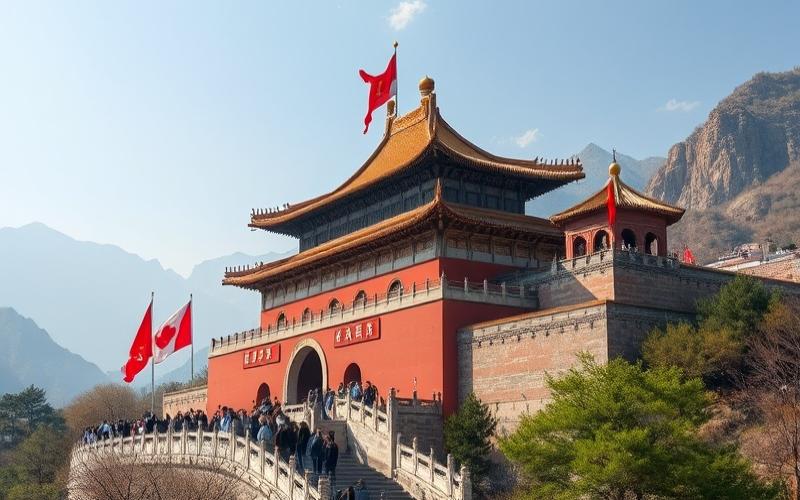
 Published on and written by Cyril Jarnias
Published on and written by Cyril Jarnias
China’s vastness, with its expansive landscapes and rich history, attracts many expatriates eager to immerse themselves in a fascinating and complex culture. However, settling in a country with such distinct customs can present significant challenges.
This is where expatriate networks and associations play a crucial role, providing not only essential resources for navigating administrative procedures and cultural shock but also valuable emotional support.
These communities quickly become anchors for building connections, sharing experiences, and discovering China from a new perspective.
Discover how these dynamic associations shape the lives of expatriates in China, helping them not only adapt but also thrive in this vibrant environment.
Support Networks for Expatriates in China
Support networks for expatriates in China play a fundamental role in social integration, practical mutual aid, and experience sharing. Several major types of support are available to foreigners living in China:
- Chinese social media groups (WeChat, Xiaohongshu, Douyin): essential for daily communication and networking.
- Cultural associations and expatriate clubs (example: InterNations): facilitate offline meetings around social or cultural activities.
- Community mutual aid services: forums, WeChat groups dedicated to specific topics (housing, employment, family life), platforms for practical advice.
| Network Type | Concrete Examples | Main Function |
|---|---|---|
| Social Networks | WeChat, Xiaohongshu | Instant communication, mutual aid |
| Associations | InterNations | Cultural events and meetings |
| Specialized Groups | Expatriate forums on WeChat | Targeted practical advice |
Key Functions of Support Networks
- Facilitating social integration
- Regular organization of events allowing newcomers to meet their peers.
- Opportunity to communicate in one’s native language or bilingually depending on the community.
- Practical assistance
- Rapid dissemination of reliable information about daily life (housing, health).
- Local recommendations thanks to experience shared by long-term residents.
- Experience sharing
- Dedicated spaces to ask questions without judgment.
- Sharing tips regarding Chinese administration or children’s schooling.
Impact of Linguistic and Cultural Differences
Chinese platforms like WeChat are indispensable but often require linguistic adaptation: their interface is mostly in Chinese.
Some groups remain closed to non-Chinese speakers; however, many offer multilingual support thanks to the active presence of experienced members.
A deep understanding of the local cultural context enhances network effectiveness: respecting Chinese social hierarchy and adopting a moderate tone significantly facilitates exchanges.
Concrete Examples
WeChat: used to create private groups among expatriate neighbors or French-speaking parents – an indispensable daily tool for any administrative procedure or local financial transaction.
InterNations China: offers a dynamic directory with monthly events so that every newcomer can quickly build their own international social circle while accessing a document database updated by experienced peers.
The crucial importance of these networks lies in their ability to break isolation, offer privileged access to local information, provide moral support during the initial cultural shock, and encourage a lasting feeling of “belonging somewhere” even far from home. For many expatriates in China today,
These communities are much more than just an informational channel; they constitute an indispensable social safety net for individual well-being.
Good to know:
In China, expatriates benefit from varied support networks, essential in facing cultural and linguistic challenges. Among the main types of support are WeChat groups, such as Expats in Shanghai, which facilitate the exchange of practical and social information, and cultural associations like the Beijing Expat Network, which organize events promoting integration. Mutual aid services, such as InterNations, offer a space to share experiences and provide mutual assistance, thus helping to overcome the initial cultural shock. However, proficiency in Mandarin can influence accessibility to some of these networks and their effectiveness, highlighting the importance of choosing English-speaking or multilingual networks for better integration. These online and physical communities play a crucial role in the psychological well-being of expatriates by providing moral support and facilitating the acquisition of essential local resources.
Expatriate Associations: Roles and Implications
Expatriate associations in China play a central role in the daily lives of foreigners, facilitating their cultural and social integration, access to employment, and the creation of professional networks.
Main Roles of Associations:
- Integration support: Welcoming newcomers, organizing intercultural events, helping to discover local customs.
- Professional guidance: Workshops on job searching, advice for business creation or international corporate volunteering (VIE/VIA), connection with local chambers of commerce.
- Social and professional networking: Regular meetings among expatriates, thematic forums on specific issues (taxation, health), sharing reliable information thanks to local experts.
Implications for Expatriates:
- Personal development through better adaptation to the Chinese context (language workshops, discovery of traditions).
- Professional development through facilitated access to local opportunities and key contacts in the Chinese job market.
- Privileged access to certain services (school scholarships, administrative support).
Concrete Examples of Active Associations:
| Association | Main Mission | Structure | Activities Offered |
|---|---|---|---|
| Union of French Abroad Shanghai (UFE) | Defend moral & material interests; break isolation | President + local team | Monthly meetings; conferences; business partnerships |
| Solidarity Alliance Canton/Wuhan/Chengdu | Facilitate access to administrative/professional information | Volunteer committee | Legal seminars; administrative assistance |
| Couleurs de Chine | Support schooling of Miao children via sponsorships | France office + local relays | Humanitarian missions; cultural events |
Nature of Activities:
- Professional conferences
- Open house days for newcomers
- Multicultural encounters with Chinese residents
- Solidarity actions (educational sponsorships)
Common Challenges Faced by These Associations:
Managing diversity: Members often come from multiple nationalities or different cultures. This requires inclusive and adapted communication.
Interactions with local authorities: Administrative procedures are sometimes complex. The need to obtain official approvals can slow down certain associative initiatives.
Global Impact on Expatriate Communities:
Associations enable better cohesion among expatriates while promoting cultural rapprochement with Chinese residents. They contribute to intercultural dialogue through their shared events and strengthen the sense of community belonging while opening their members to Chinese realities.
Testimonials / Case Studies:
“Thanks to UFE Shanghai, I found a job upon arrival and formed my first friendly bonds.”
– Experience shared during a networking workshop
“My involvement with Couleurs de Chine not only allowed me to help concretely but also to better understand local society.”
– Virginie Duret
Checklist of Essential Contributions:
- Facilitated access to professional resources.
- Determining social support to combat isolation.
- New personal perspectives through local volunteering.
- Intercultural mediation between foreign and Chinese communities.
The structuring importance of associations is thus measured both in their capacity to accompany each step of the expat journey and in their active contribution to the local social fabric.
Good to know:
Expatriate associations in China play a crucial role in the cultural and social integration of newcomers, offering services such as support for job searching and the creation of professional networks. For example, the Shanghai Expat Association regularly organizes events aimed at facilitating relationships between expatriates and local residents, while helping to develop the personal and professional skills of its members. These associations, although beneficial, often must navigate the challenges of diversity among their members and maintain harmonious interactions with local authorities. Through their presence, they significantly contribute to cultural rapprochement and enrich the expatriate community in China, illustrating their positive impact through testimonials from members who have found unique opportunities thanks to their associative engagement.
Social Events Dedicated to Expatriate Communities
Social events for expatriates in China are varied and adapted to multiple needs: integration, networking, cultural discovery, and conviviality.
Here are the main types of events organized:
- Cultural encounters: exhibitions, artistic workshops, guided tours of historic neighborhoods, culinary evenings around local or international specialties.
- International evenings: multicultural aperitifs in bars or cafes where each participant can share their traditions; themed parties (International New Year, Halloween…).
- Professional networking activities: business lunches, sector conferences, and exchange forums among entrepreneurs or foreign employees.
- Language cafes: informal meetings to practice Chinese (or another language) with locals and other expatriates; these events promote rapid creation of social bonds.
- Sports outings or common leisure activities: urban hikes, friendly tournaments (tennis, soccer), group photo sessions.
Main Cities Where These Events Are Frequent
| City | Particularities |
|---|---|
| Beijing | Political and cultural capital; numerous international groups |
| Shanghai | Major economic hub; strong francophone associative presence |
| Shenzhen | Young and dynamic city; attractiveness for entrepreneurs |
Major Organizations Involved in Organization
- InterNations
Offers monthly varied activities allowing expatriates to gather around common interests. Platform facilitating connection upon arrival thanks to its local network. - Shanghai Accueil
Volunteer association affiliated with FIAFE. Its role is crucial in personalized welcome via a mentoring/welcome cafe system that helps each newcomer get oriented quickly. Organizes cultural outings/leisure/holiday parties year-round. - Solidarité Shanghai & La Ruche
Solidarity structures offering moral/logistical support to newly settled French people (administrative assistance, practical advice).
WeChat also plays a central role thanks to private groups by city allowing expatriates:
- To stay informed about upcoming events
- To easily access the local network
- To quickly find a friendly circle
Expatriate Testimonials Illustrating Social Impact
“Participating in the language cafe not only allowed me to progress in Mandarin but above all to create my first friendships here – it makes daily life much more pleasant.”
“The international evenings organized by InterNations gave me access to a very diverse community with whom I could exchange our respective experiences. You feel less alone when you know you share the same challenges.”
“Thanks to the mentoring system offered by Shanghai Accueil I discovered my neighborhood differently… I even found a French bakery!”
Positive Effects Linked to Cultural Diversity During Gatherings
- Constant intellectual stimulation linked to intercultural exchanges
- Active promotion of multiculturalism—each shares their customs without judgment
- Natural development of open-mindedness among all participants
- Rapid creation of a close-knit community where mutual aid and respect become essential
These multicultural spaces thus allow:
- Newcomers to integrate without major difficulty
- Building a genuine local international community
- Mutually enriching their professional/personal journeys
Good to know:
In Beijing, Shanghai, and Shenzhen, social events for expatriates, such as cultural encounters and international evenings, are particularly common. Organized by associations such as Internations or Shanghai Expatriate Associations, these meetings serve as networking platforms, facilitating the integration of newcomers. Expatriate testimonials emphasize that these events have not only enriched their social experience but have also created a valuable support community. The cultural diversity present at these encounters encourages open-mindedness and multiculturalism, thus strengthening bonds between expatriates and locals. These events become essential for those seeking to navigate life in China, offering a space to exchange ideas and practical advice.
Disclaimer: The information provided on this website is for informational purposes only and does not constitute financial, legal, or professional advice. We encourage you to consult qualified experts before making any investment, real estate, or expatriation decisions. Although we strive to maintain up-to-date and accurate information, we do not guarantee the completeness, accuracy, or timeliness of the proposed content. As investment and expatriation involve risks, we disclaim any liability for potential losses or damages arising from the use of this site. Your use of this site confirms your acceptance of these terms and your understanding of the associated risks.

























































